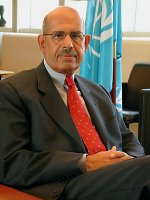Dr.Mohamed ElBaradei

Dr.Mohamed ElBaradei konuşmasını dinlemek için Mısırlı arkadaşlar ile konferans yolunu tutuk. Onlar için gurur günü idi. Ben ise aslında Dr.Mohamed ElBaradei'n ne diyeceğini ve dinleyicilerden gelecek sorulara verecek cevapları merak ediyordum.
Dr.Mohamed ElBaradei kısa konuşmasında nükleer enerjisi ile elde edilen enerjinin diğer enerji kaynakları ile elde edilenlerden daha ucuz olduğunu, dünyada gelişmiş ve bizim gibi gelişmekte olan ülkelerin nükleer rektör yapımına yöneldiklerini, hemen yanı başında bir reaktör olan ülkenin aslında oluşacak kazada kader arkadaşlığı yapacağını ama gelişen kontrol sistemleri ile kaza oranlarının çok aza indirildiğini anlattı.. Yani bildik şeyleri söyledi. Söylemediği uranyumun kimlerden ve ne pahasına alacağımız idi. Yani zengileştirilmiş uranyumu kim bize satacaktı. On yılda yaptığın reaktörü hangi teknolojik kriterlere göre test edeceğini anlatmadı. Sonuç itibari ile bir nobel barış ödülü töreni gibi geçti.
Fakat dinleyicilerden ilginç sorular geldi. Özellikle İran ve Japonya ile ilgili. Bu kadar övülen reaktörü neden İran yapmasın, hemde yanı başındaki ülkeler reaktörler çalışırken. Japonya'nın reaktör çalışmalarından bahsedildi. Ve kötü çocuk Kuzey Kore soruldu. Dr.Mohamed ElBaradei bunlara kısa cevaplar verdi.
Detail Information from TechTalk :
A multinational approach to producing nuclear energy and storing waste is key to solving many of the problems that beset this energy source, said Nobel laureate
Mohamed ElBaradei, director general of the International Atomic Energy Agency (IAEA), who gave this year’s avid J. Rose Lecture on Nuclear Technology at MIT on
Thursday, Nov. 3. “The benefits of nuclear energy are needed more than
ever,” ElBaradei told an overflow crowd in the Stata Center’s Kirsch Auditorium. The speech was webcast live, and can still be viewed on the MIT World web site.
“Global energy consumption will be almost 60 percent higher in 2030 than it is now and will double by the middle of the century,” he said. But troubling issues remain, including security. ElBaradei and the IAEA were awarded the 2005 Nobel Peace
Prize last month “for their efforts to prevent nuclear energy from being used for military purposes and to ensure that nuclear energy for peaceful purposes is used in the safest possible way.” ElBaradei also stressed that “no discussion of energy
is complete without considering the global energy imbalance.” People in developing countries like Nigeria live with 100 times less electricity than the average citizen in the developed world, and 200 times less than a person in the United States, he said. “One in four of our fellow human beings lacks access to modern energy services,” he said. As a result, for reasons including the availability and
comparatively low cost of uranium fuel, “the case for constructing new nuclear power plants is gaining ground in many countries,” ElBaradei said. We cannot afford the risk of having power plants in every country, he said. Therefore, he advocates multinational approaches to the nuclear fuel cycle. “More than one country has to have oversight [over a given plant] to ensure that no one country can control
enrichment of uranium,” he said. The world must also work out a way to share the resulting energy to “provide assurance of supply for all countries. If we can do so, that will address 80 percent of the problems we are facing. If a country can receive all of its energy needs, it is very difficult to justify why they need their own reactor.”
Next, he said, we need a multinational approach to the reprocessing and management
of spent fuel, including multinational repositories for the waste. Russia has proposed developing such a facility, “but we need one or two other major repositories” as well.
Finally, he recommended that we “go after those who already have enrichment
or reprocessing facilities [such as the United States and Japan] and try to multinationalize those systems.” “Unless the nuclear weapon states provide
the leadership, unless they show and create the environment that nuclear weapons
[are] an historical accident that we are trying to extract ourselves from as quickly
as possible, we will have that cynical view around that world that you are creating
the haves and the have-nots,” said ElBaradei later in response to a question from
Renata Rose, wife of the late David J. Rose, for whom the lecture series was named.
“You cannot just say, ‘we are the good guys, trust us.’”

<< Home